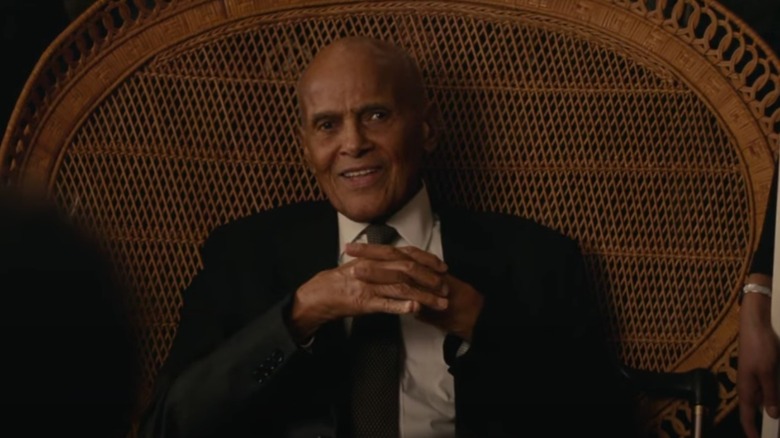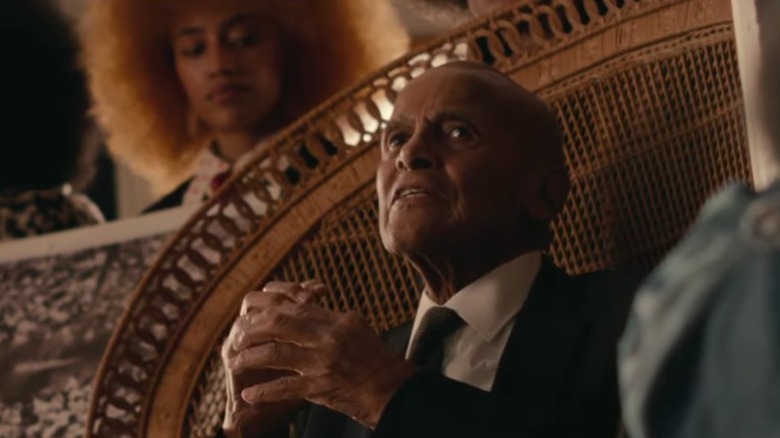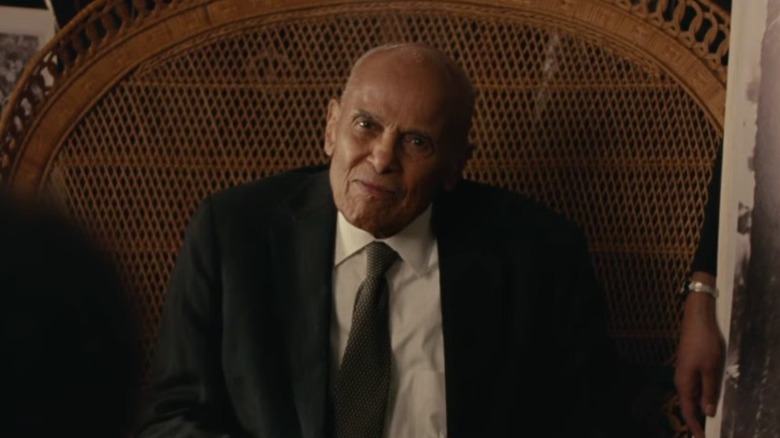Harry Belafonte Almost Didn't Get The Okay From His Doctor To Be In BlacKkKlansman
Singer, actor, and activist Harry Belafonte has passed away at the age of 96. Along with his rich, prolific musical career, Belafonte leaves behind an impressive legacy on screen. From one of his earliest roles in Otto Preminger's "Carmen Jones" to his last appearance in Spike Lee's "BlacKkKlansman," Belafonte left an unforgettable impression. The actor worked with talented filmmakers like Robert Altman, Robert Wise, Ava DuVernay, and Sidney Poitier, and appeared in Lee's 2006 look at the aftermath of Hurricane Katrina, "When The Levees Broke." But he and Lee would also work together one more time, in a role that the then-elderly Belafonte had to get approved by a doctor.
Belafonte's scene in "BlacKkKlansman" gives the darkly funny movie about a Black cop infiltrating the KKK a sense of gravity and history; in a nine-minute scene, Black students and activists sit rapt and engrossed around a seated Belafonte as he speaks about the brutal truth of America's Jim Crowe era. Belafonte talks about the racist 1915 D.W. Griffith film "The Birth of A Nation," which reignited the then-somewhat dormant Klan. He also describes the real-life lynching of Jesse Washington, a 17-year-old Black boy who was tortured and killed in Texas in 1916, from the perspective of a witness to the crime.
Belafonte's final on-screen role almost didn't happen
The scene is solemn, informative, and heartbreaking, and it also relays the specific experience of leaning in to listen to one's elders as they share vital perspectives on parts of history that are often buried today. Belafonte, however, almost didn't get the sign-off to work on "BlacKkKlansman" at all. The musician and actor was by then entering his 90s and hadn't acted on screen since 2006. According to Deadline, Belafonte and Lee — who called the icon "Mr. B" — had a history together, with Lee's musician father Bill Lee as the common denominator. The filmmaker told Deadline that whenever he ran into Belafonte, "Mr. B would say, do you have to use Ossie Davis in every film? He always said it playfully, but I knew he was serious."
Davis, an actor and activist who appeared in Lee's films including "School Daze," "Malcolm X," and "Do The Right Thing," was born a decade before Belafonte and acted up until his own death in 2005. Belafonte's joking refrain apparently made it easy for Lee to think of the musician when it came time to make "BlacKkKlansman." "Here, all I thought of was Mr. B," he shared. "I called him up, sent him the script and he loved it but his doctor wouldn't give him permission." It had been a long time since Belafonte stepped foot on a movie set, and his healthcare provider clearly didn't think it was a good idea for the aging performer.
Lee made sure the crew dressed in their 'Sunday best' for Belafonte's shoot
Lee wasn't deterred. "I didn't pressure him, but I did not give up," he shared. "It was only a one-day shoot, and I pushed that scene until the last day of principal photography, hoping his doctor would change his mind." Belafonte finally got the okay from his doctor to work, just a few days before the scene was set to be filmed. "When he called the Monday before that Friday and said, 'I got the doctor's OK,' I said, 'Thank you, Jesus,'" Lee told Deadline.
The filmmaker treated Belafonte's appearance with the respect the industry veteran and Civil Rights Movement pioneer deserved. He says he told the crew to show up in their "Sunday best" for "a very special guest," complete with suits and ties. Today, Lee shared a photo of the two legendary artists to Instagram, along with a reminder: "We have to celebrate our elders while they are with us," Lee wrote in a caption memorializing the star. Belafonte's turn in "BlacKkKlansman" did exactly that; his character speaks as an eyewitness to history, but his turn in the film also feels like history happening before our very eyes. Lee gave Belafonte a role befitting of his stature and legacy, not just as a pillar of the music industry, but as a Black man who survived a dangerous time in American history, who raised funds to bail Martin Luther King, Jr. out of a Birmingham Jail, and who made art that moved the world through it all. Thank goodness for that doctor's note, and for everything Belafonte gave us.


